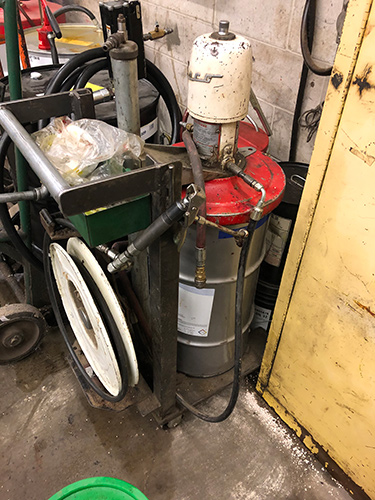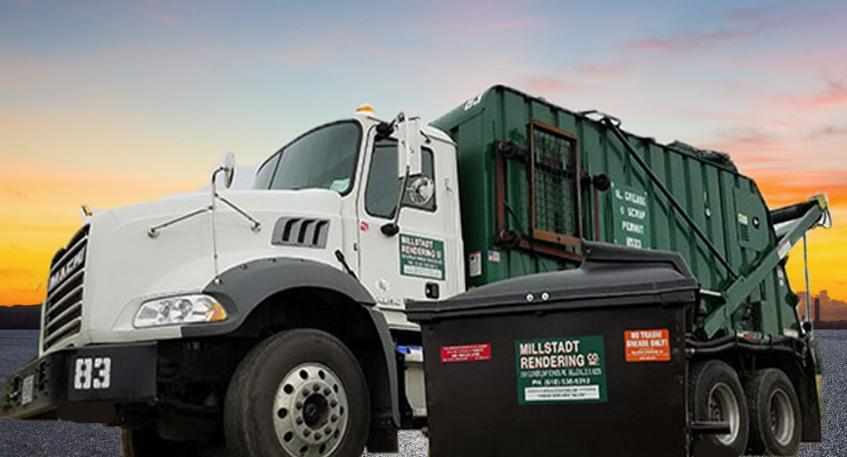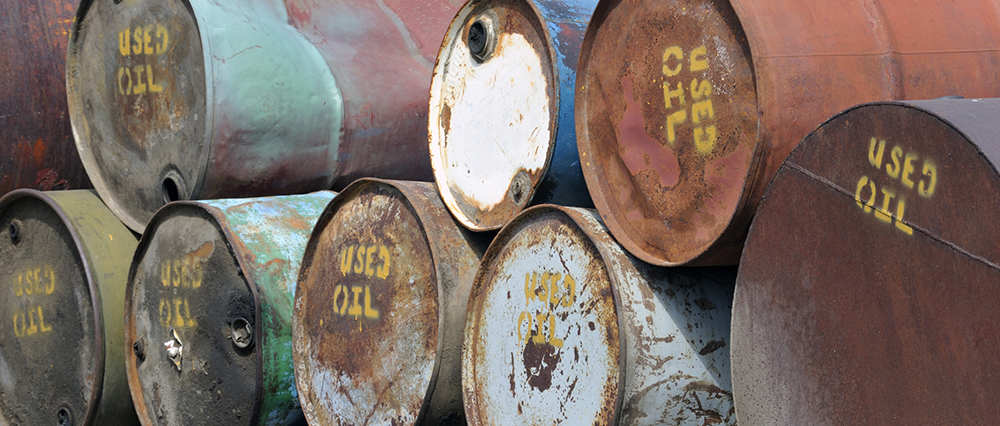Grease drum recycling involves repurposing used grease drums to prevent environmental contamination and conserve resources. Proper recycling reduces waste and supports sustainability.
Grease drum recycling is crucial for maintaining environmental health. Used grease drums, often found in industrial settings, can cause significant pollution if not handled properly. Recycling these drums reduces waste and ensures that harmful substances do not leak into soil and water sources.
It also supports resource conservation by allowing materials to be reused rather than discarded. Many recycling facilities specialize in cleaning, reconditioning, and repurposing grease drums, making the process efficient and eco-friendly. Businesses benefit by adhering to environmental regulations and promoting a green image. Effective grease drum recycling is a vital step towards a sustainable future.

Credit: www.graco.com
Introduction To Grease Drum Recycling
Grease drum recycling is vital for a clean environment. Industries use grease drums for storing and transporting grease. Proper recycling of these drums reduces waste and pollution. It also conserves valuable resources.
The Importance Of Recycling Industrial Containers
Recycling industrial containers like grease drums is crucial. It helps in keeping our surroundings clean and safe. Here are some key reasons for recycling:
- Reduces landfill waste: Recycling prevents drums from filling up landfills.
- Conserves resources: Recycled materials can be reused in new products.
- Prevents pollution: Proper recycling keeps harmful substances out of the environment.
- Energy savings: Recycling uses less energy compared to producing new containers.
Current Challenges In Grease Drum Disposal
Disposing of grease drums poses several challenges. Here are some of the main issues:
| Challenge | Description |
|---|---|
| Hazardous Waste | Grease can be hazardous, requiring special handling. |
| Cost | Proper disposal and recycling can be expensive. |
| Regulations | Complying with local laws can be complicated. |
| Lack of Facilities | Not all areas have recycling facilities for grease drums. |
Addressing these challenges requires a collective effort. Businesses and governments must work together. This ensures safe and effective grease drum recycling.
Types Of Grease Drums
Grease drums come in various types. Each type serves different needs. Understanding these types helps in recycling efforts. Different materials and sizes exist.
Materials Used In Drum Manufacturing
Grease drums are made from various materials. Steel and plastic are the most common. Each material has its own benefits.
- Steel Drums: Durable and strong. Ideal for heavy-duty use.
- Plastic Drums: Lightweight and resistant to corrosion. Suitable for many environments.
Common Sizes And Capacities
Grease drums come in different sizes. The size depends on the amount of grease they need to store. Common sizes are 55-gallon and 30-gallon drums.
| Size | Capacity |
|---|---|
| 55-gallon drum | 208 liters |
| 30-gallon drum | 114 liters |
Environmental Impact Of Grease Drums
Grease drums are essential for storing and transporting lubricants. Yet, their disposal can cause environmental harm. Proper recycling can mitigate these risks. This section explores the environmental impact of grease drums.
Pollution Risks From Improper Disposal
Improper disposal of grease drums can lead to soil and water contamination. Harmful chemicals can seep into the ground. This can affect plant and animal life. Contaminated water sources can become unsafe for humans. Burning grease drums releases toxic fumes. These fumes can harm the air quality. They pose health risks to nearby communities.
Lifecycle Assessment Of Grease Drums
A lifecycle assessment evaluates a product's environmental impact from creation to disposal. For grease drums, this includes:
- Production: Manufacturing grease drums uses raw materials and energy.
- Usage: Storing and transporting grease without spillage is crucial.
- Disposal: Improper disposal can lead to pollution and waste.
- Recycling: Recycling can save resources and reduce waste.
Recycling grease drums involves cleaning and repurposing them. This reduces the need for new materials. It also minimizes waste in landfills. Efficient recycling practices can significantly lower environmental impact.

Credit: millstadtrendering.com
Regulations And Compliance
Proper grease drum recycling is crucial for protecting the environment. Businesses must comply with regulations and standards. Understanding these rules helps avoid fines and protect the planet.
International Standards For Drum Recycling
Various international standards govern grease drum recycling. Organizations like the ISO set these standards. These rules ensure safe and effective recycling.
- ISO 14001: Focuses on environmental management systems.
- ISO 9001: Ensures quality management in recycling processes.
- Basel Convention: Controls hazardous waste movements.
Businesses must follow these standards. Compliance ensures safe handling and disposal of drums. Non-compliance can lead to severe penalties.
Local Laws Governing Industrial Waste
Local laws also play a vital role. Different countries have specific regulations. Businesses must understand and follow these local rules.
| Country | Key Regulation |
|---|---|
| United States | Resource Conservation and Recovery Act (RCRA) |
| United Kingdom | Environmental Protection Act 1990 |
| Australia | National Waste Policy |
Understanding these laws is crucial. Businesses must keep records and follow guidelines. This helps in proper disposal and recycling of grease drums.
Regular training and updates on these laws are important. Employees should be aware of the latest regulations. This ensures compliance and protects the environment.
Recycling Process For Grease Drums
The recycling process for grease drums is essential for a clean environment. This process involves several stages to ensure proper recycling. Below, we outline key steps in this process.
Collection And Sorting
The first step is collection and sorting of grease drums. Drums are collected from various sources. This includes industries, restaurants, and automotive shops. The collected drums are then sorted based on their condition. Sorting helps in determining the next steps for each drum.
- Industries
- Restaurants
- Automotive shops
Sorting ensures that damaged drums are separated. Usable drums go through further processing. This step is crucial for efficient recycling.
Cleaning And Decontamination
After sorting, the drums go through cleaning and decontamination. This step removes any grease residue and contaminants. Clean drums are safe for recycling and reuse.
| Step | Description |
|---|---|
| Initial Cleaning | Removing large grease deposits |
| Decontamination | Eliminating hazardous substances |
| Final Rinse | Ensuring the drum is clean |
This process involves several stages:
- Initial Cleaning: Removing large grease deposits.
- Decontamination: Eliminating hazardous substances.
- Final Rinse: Ensuring the drum is clean.
Thorough cleaning is important for safe recycling. It also prevents contamination of new materials.
Innovative Recycling Techniques
Grease drum recycling is crucial for environmental health. Innovative techniques make it efficient and sustainable. This section explores cutting-edge methods for recycling grease drums.
Advanced Decontamination Technologies
Decontamination ensures grease drums are free from hazardous substances. Advanced technologies make this process efficient. Ultrasonic cleaning uses sound waves to remove contaminants. This method is quick and effective.
Steam cleaning is another technique. It uses high-pressure steam to clean drums. This method is eco-friendly. Chemical treatments can also be used. These treatments dissolve grease and other residues.
Here is a table showing different decontamination technologies:
| Technology | Method | Benefits |
|---|---|---|
| Ultrasonic Cleaning | Sound Waves | Quick, Effective |
| Steam Cleaning | High-Pressure Steam | Eco-Friendly |
| Chemical Treatment | Chemicals | Dissolves Residues |
Reuse And Repurposing Strategies
Reusing grease drums reduces waste. Refurbishing is one strategy. Drums are cleaned and repaired for reuse. This method extends their life.
Repurposing is another approach. Old drums can be turned into new products. Planters, furniture, and art are common repurposing ideas. This method adds value to old drums.
Here are some repurposing ideas:
- Planters
- Furniture
- Art
Recycling is the final step. Drums are broken down and recycled into raw materials. This process is eco-friendly and sustainable.
Benefits Of Recycling Grease Drums
Recycling grease drums is a smart choice. It offers many benefits. These benefits help the environment and businesses.
Conservation Of Resources
Recycling grease drums saves natural resources. We reuse metal and plastic from the drums. This reduces the need for new materials.
This process also lowers the demand for new oil. Used grease can be cleaned and used again. This reduces oil consumption.
We protect forests and wildlife by recycling. Less mining and drilling occur. This helps preserve nature.
Economic Advantages For Businesses
Recycling grease drums can save money for businesses. They do not need to buy new drums often. Recycled drums are cheaper.
Businesses can sell their used grease. This adds a new income stream. They can also avoid disposal costs.
Recycling helps businesses comply with environmental laws. This avoids fines and penalties. It also improves their public image.
| Benefit | Description |
|---|---|
| Cost Savings | Recycled drums are cheaper. |
| Additional Income | Sell used grease for profit. |
| Compliance | Avoid fines and penalties. |

Credit: www.sclubricants.com
Case Studies
Grease drum recycling has become essential in industries. Several companies have implemented successful programs. These case studies highlight the impact and long-term benefits of recycling.
Successful Recycling Programs In Industry
Many companies have adopted effective grease drum recycling programs. They reduce waste and save costs. For instance, Company A installed a drum cleaning system. They clean and reuse drums multiple times. This reduces the need for new drums by 80%.
Company B partnered with a recycling firm. They collect used drums weekly. The firm recycles the drums into new products. This program decreased landfill waste by 50%.
Impact Assessment And Long-term Benefits
Recycling programs offer significant benefits. A study on Company C shows impressive results. They measured the environmental impact over five years.
| Year | Drums Recycled | Waste Reduced |
|---|---|---|
| 1 | 500 | 10% |
| 2 | 1200 | 25% |
| 3 | 1800 | 35% |
| 4 | 2300 | 45% |
| 5 | 3000 | 60% |
The table shows a steady increase in recycled drums. Waste reduction also improved annually. These programs create sustainable business practices. Long-term benefits include lower costs and improved environmental impact. Recycled materials can be used in various industries. This reduces the need for raw materials.
In summary, grease drum recycling case studies show positive results. The programs reduce waste and save money. The long-term benefits are clear and impactful.
Future Of Grease Drum Recycling
The future of grease drum recycling is bright and promising. Recycling helps protect the Earth. New trends and technologies make recycling better.
Emerging Trends In Sustainable Practices
Sustainable practices are becoming popular. People want to save the planet. Here are some trends:
- Using eco-friendly materials for drum manufacturing.
- Implementing zero-waste policies in industries.
- Encouraging community participation in recycling programs.
These trends help reduce waste. They also promote a cleaner environment.
Technological Innovations In Recycling
New technologies are making recycling easier. They help recycle drums faster and safer. Some key innovations include:
- Automated sorting systems for better efficiency.
- Advanced cleaning methods to remove grease.
- Smart tracking systems to monitor recycling processes.
These innovations save time. They also make recycling more effective. Industries are adopting these new methods. This helps make a big impact.
How Companies Can Get Involved
Grease drum recycling offers many environmental benefits. Companies can play a crucial role in this process. This section will explore how businesses can participate in grease drum recycling.
Starting An In-house Recycling Program
Setting up an in-house recycling program is a great first step. This initiative can help your company manage waste efficiently.
- Educate employees about the importance of recycling.
- Designate specific areas for grease drum collection.
- Label containers clearly to avoid contamination.
- Monitor the program regularly to ensure compliance.
Provide training sessions for staff. This will help them understand the recycling process. Use posters and emails to keep everyone informed.
Partnering With Specialized Recyclers
Another effective method is partnering with specialized recyclers. These companies have the expertise to handle grease drums properly.
| Benefits | Details |
|---|---|
| Expertise | Specialized recyclers know how to manage waste safely. |
| Efficiency | They can process large volumes quickly and effectively. |
| Compliance | Ensure your company meets local regulations. |
To find a reliable recycler, do some research. Look for companies with good reviews. Check their certifications and compliance records.
By taking these steps, companies can contribute to a cleaner environment. Grease drum recycling is a vital part of waste management.
Consumer Responsibility
Consumers play a vital role in grease drum recycling. Their actions and choices impact the environment. Understanding consumer responsibility can drive positive change. Everyone must contribute to sustainable practices.
Educating End-users On Recycling
Educating end-users about recycling is essential. Awareness helps people make better choices. Schools, communities, and businesses can offer recycling workshops. Clear instructions on grease drum disposal should be provided. Use easy-to-understand labels and signs. Highlight the environmental benefits of recycling. Share success stories to inspire action.
Encouraging The Demand For Recycled Products
Encouraging the demand for recycled products is crucial. Consumers should choose items made from recycled materials. This supports the recycling industry. Manufacturers respond to consumer demand. Increased demand leads to more recycled product options. Educate consumers on the benefits of recycled products. Highlight cost savings and environmental impact.
| Action | Benefit |
|---|---|
| Recycle grease drums | Reduces landfill waste |
| Buy recycled products | Supports the recycling industry |
| Attend recycling workshops | Increases awareness |
- Recycling saves resources.
- It reduces pollution.
- Encourages sustainable practices.
- Learn about recycling.
- Choose recycled products.
- Share knowledge with others.
Frequently Asked Questions
What Is Grease Drum Recycling?
Grease drum recycling involves reprocessing used grease drums to extract residual grease and repurpose the metal. It helps in reducing waste and promoting sustainability.
How To Recycle Grease Drums?
To recycle grease drums, clean them thoroughly and take them to a recycling facility. Ensure all residual grease is removed to avoid contamination.
Why Is Grease Drum Recycling Important?
Grease drum recycling reduces environmental waste and conserves natural resources. It also promotes sustainability by repurposing the metal and preventing landfill overflow.
Can All Grease Drums Be Recycled?
Not all grease drums can be recycled. Ensure they are not contaminated with hazardous materials. Check with your local recycling facility for specific guidelines.
Conclusion
Recycling grease drums is essential for a sustainable future. It helps reduce waste and protects the environment. Proper disposal keeps hazardous materials out of landfills. Engage in grease drum recycling to contribute to a greener planet. Make eco-friendly choices for a better tomorrow.